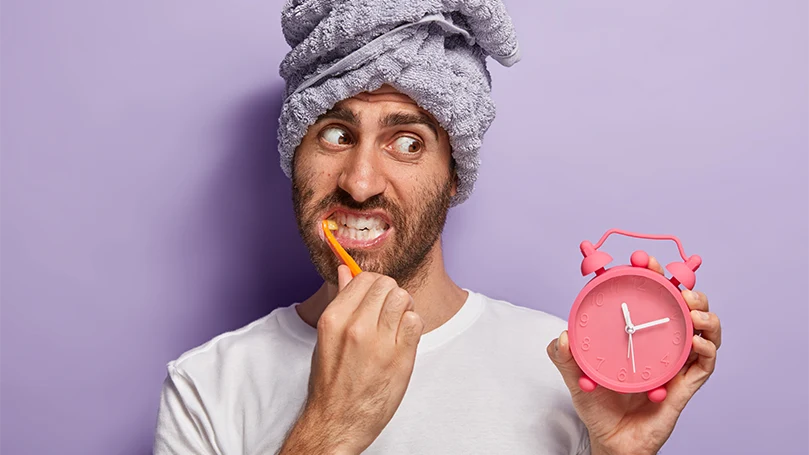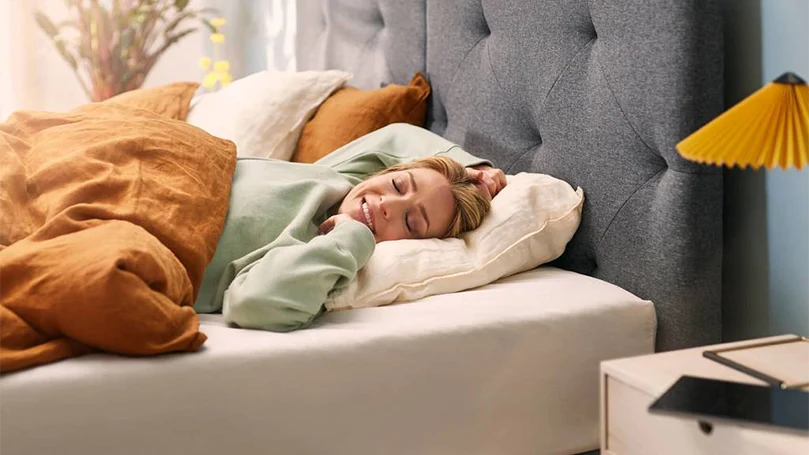When should you go to sleep?

As a general rule of thumb, an average person should go to sleep around 10-11 pm, as that's considered to be an ideal bedtime. However, as we all know, there are no universal truths when it comes to sleeping.
Thankfully, plenty of research has been done on this topic, and there is strong evidence that supports this theory. The human body's natural circadian rhythm or a sleep-wake cycle suggests that our bodies and brains slow down and get sleepy as the night falls down, just like they start to wake up as the sun rises.
Therefore, when we take into consideration the average amount of sleep human body needs, we come to a conclusion that falling asleep around 10-11 pm is the best time to sleep, or better yet – fall asleep. That way, you'd end up waking up feeling refreshed and rested around 6-7 am, ready to start your day.
So, if your work schedule allows you to do so, you should prioritize early bedtimes. In doing so, you might just develop a foolproof internal clock that'll allow you to get up without an alarm clock going off in the morning.
What is circadian rhythm and what does it have to do with sleep?

A circadian rhythm is our body's sleep clock-wake cycle that's in alignment with natural light.
If all of us got to enjoy a regular sleep schedule that's not affected by our work, we'd all probably go to bed earlier, as our natural circadian rhythm would have us fall asleep in the late evening hours when it gets dark. However, circadian rhythm is adaptable to our lifestyle and habits.
For instance, shift workers usually have a hard time enjoying a natural sleep cycle. Their bodies adapt to sleeping during the day and working during the night, so their body clock shifts. Another thing that's known to affect our circadian rhythms are electronics. Blue light exposure from displays can trick our brains into thinking it's still bright outside, preventing us from falling asleep earlier.
Despite the fact that the circadian rhythm is adaptable, there is strong evidence that suggests that turning it upside down leads to an array of problems, from minor mental health problems to outright depressive symptoms.
That is why, according to National Sleep Foundation, practising adequate sleep hygiene and better sleep habits is more than essential.
How much should we sleep according to our ages?

Not everyone needs the same amount of sleep during the night. Grown people need less sleep than newborns, and teenagers need more sleep than senior citizens. Still, this does not mean you shouldn't skip bed time – otherwise you can develop sleep debt issues.
According to experts in the field, we need most sleep at the earliest stages of our life, and as we get older, our sleep requirements drop.
Naturally, sleep duration is not all that matters and sleep quality definitely takes precedence over it. But, with that being said, here are some optional numbers to make sure you get enough sleep each night.
0-3 months

During the first three months of our life – we're mostly asleep. According to research, babies younger than three months need at least 14 to 17 hours of quality sleep. Seeing how sleep is absolutely essential for our development, anything less than that could end up being detrimental to a child's health and safety.
4 months – 2 years

As babies get older, they become less needy of sleep. After they turn four months, up until they're two to three years old, they'll require anywhere between 11 to 16 hours of sleep.
The reason why this gap is so large is that sleep requirements will slowly drop over time, so you shouldn't keep your child at 11 hours of sleep as soon as they turn 4 months old. At that time, the best practice is to let them sleep as much as they can.
3-5 years

Once the kid turns 3 up until they turn 5, it is perfectly normal for them to sleep anywhere between 10 and 13 hours. In some instances, it could be more than that, but that's not a common occurrence.
Seeing how they're still sleeping almost half a day, it would be wise to get them to adopt a good bedtime routine. Have them fall asleep around 8 or 9 pm, so they can fully rest until the early morning.
6-13 years

At around 6-years old, kids are starting school or some sort of pre-school activity, so it's paramount that they get enough sleep every night. Up until they turn 13, you must make sure they get at least 9 hours of sleep.
It would be perfect if they could sleep anywhere from 9 to 12 hours, but at this stage, you'll already see whether your kid's a sleepyhead or not. But still, going to bed early is paramount.
14 – 17 years

Teenagers aged 14 to 17 require anywhere between 8 to 10 hours of sleep. However, as we all know, that's when things start to get a bit “interesting”. Staying up late, browsing social media, and talking to friends become more important than getting to bed.
This stage of life is when most sleep disorders usually start taking place, so talk to your teen about the importance of quality sleep.
18 – 64 years

Grown-ups need about 7 to 9 hours of sleep on average, although, at this point, we can also see people that function on far more or far less sleep.
However, the general rule of thumb is that an average adult should strive to get around eight hours of sleep each night – without expectation.
65 years +

As we get older, sleep becomes less of a priority. Most senior citizens sleep less than 7 hours each night, although generally speaking, an ideal duration would be anywhere from 7 to 8 hours. But, we all know that old folks usually sleep about 5 hours each night, and they recharge with several short naps during the day.
Should you go to sleep every night at the same time?
Is there any benefit to going to bed every night at the same time? Absolutely there is.
Going to bed every night at the exact same time will help you develop a great sleep cycle, and as soon as your body fully adjusts to it – you'll feel marvellous.
Another benefit of going to bed at the same time is that your wake up time will become pretty much constant. As you get through sleep stages during the night, your body will simply wake up around the same time each day.
This kind of routine will help you organize your life, improve your overall health, and overall just make you a happier person.
What if I sleep too much?

One of the most common questions we get is – is there such as thing as too much sleep? Unfortunately for some people – there is.
Sleeping too much is not good for you. As we said earlier, quality and longevity are not the same. Despite the fact that sleep is very beneficial for your overall health, too much of it is sometimes a sign of an underlying issue. Additionally, sleeping for more than 9 hours could lead to some health problems.
However, you don't need to panic. You could be perfectly fine and sleep a bit longer. Understanding sleep means understanding that not everyone's wired the same way, so don't trouble yourself with it too much. If you've been a sleepyhead all your life – there's probably nothing wrong.
On the other, if you require 12 hours of sleep on the regular – you should probably pay your doctor a visit. Excessive sleeping could be a sign of underlying health issues, such as:
- Depression
- Anxiety
- Sleep apnea
- Narcolepsy
- Heart disorder
- Thyroid disorder
- Hormonal imbalance.
So, as a general rule of thumb, if you sleep too much – either do a little dive into your sleeping habits or pay your doctor a visit. Any of these two should provide you with an answer or a solution.
So, what is the best time to wake up?

The best time to wake up is early in the morning after you've gotten enough rest, and generally speaking, that's somewhere around 8 hours after you've fallen asleep.
As you probably know, we go through several stages while sleeping, and one of those stages is REM sleep. You should go through four REM sleep stages before you wake up. After the fourth REM stage, our bodies should awaken on their own, but even if you rely on the alarm clock – getting woken up after the fourth REM stage should feel pretty easy, and you should wake up feeling fully rested.
One final trick we'd like to share with you is to try and set your wake time using a sleep calculator. Instead of setting your alarm for a particular time in the morning, we suggest using a sleep calculator and setting a timer about 8 hours and 15 minutes from the exact time you go to bed.
That way, you'll have accounted for the time it takes you to fall asleep, and the time it takes to go through all the stages and get a full night of restful sleep. That way, the alarm won't shock you, you'll wake up rested, and you'll probably start waking up before the alarm sooner rather than later. As far as we're concerned, the ideal time to wake up would be at 6:30 in the morning. In an ideal world, you'd go to bed at 10:30 pm, and you'd wake up at 6:30 am – fully rested and ready to take on the day.
Spread the word
Recommended reading:















There are no comments yet
"*" indicates required fields